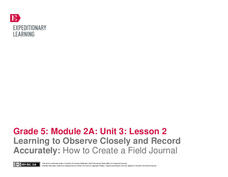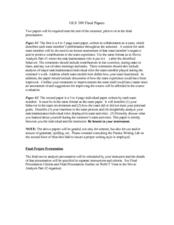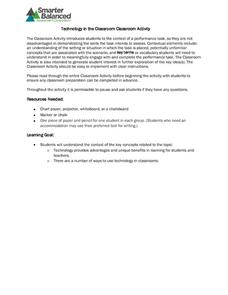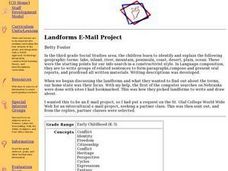CK-12 Foundation
Values Written as Powers: Binary Numbers 1 to 8
A six-question interactive tasks scholars with adding binary numbers one through eight. A tool acts as a visual aid to showcase the patterns made when working with base—2, digits zero and one. Question types include fill in the blank,...
Stanford University
Kent State
Why did a peaceful student protest end in disaster? Young historians explain the impact of the Kent State shooting. Academics analyze a photo of the Kent State shooting and explain the significance of the event by completing short answer...
EngageNY
Learning to Observe Closely and Record Accurately: How to Create a Field Journal
Look carefully. Scholars practice observing and recording the natural world around them by looking out a window or viewing an image. Learners discuss how their experience compares to that of Meg Lowman in The Most
Beautiful Roof in the...
Curated OER
Final Papers: Writing Prompts for Evaluating Team and Individual Performance
To be used in connection with a group project or at the end of a unit, this handout contains two essay writing prompts. The first prompt asks a group of learners to work together to evaluate their groups' performance as well as each...
Smarter Balanced
Technology in the Classroom
To prepare for a formative assessment on the benefits of technology in the classroom, groups generate a list of the types of technology that could be used in a classroom and then discuss how each of these items could be used. Group...
Curated OER
Harvesting the Crop
What is philanthropy? To find out learners explore the concept through class discussion. They survey, make decisions, implement, and reflect on a service project intended to benefit their community.
Curated OER
News
How does broadcast news differ from accounts reported in newspapers? On the radio? Through the Internet? Middle schoolers discuss the news and speak about the differences between news in print and broadcast news. Given a list of six...
Pace University
Grades 9-12 Earth Science
How has Earth changed over time? Pupils explore the topic in a differentiated instruction unit on the geological time scale. After a pre-assessment to gauge knowledge, class members divide into groups based on their ability levels and...
ProCon
Universal Basic Income
Should the United States adopt a universal basic income? After reading brief background information, scholars research the debate topic by reviewing the top three pros and cons. They also respond to a survey question and review other...
Health Smart Virginia
Sporting Behavior
Six small groups perform skits that showcase positive sporting behavior. Actors highlight how players try their best, encourage others, win gracefully, think positively, show respect, and resolve conflict. A class discussion and an Exit...
Indigo Daya
Coping Skills
Adolescents experience strong amounts of stress during the formative teenage years. An excellent printable and worksheet can help learners discuss and develop coping skills for dealing with difficult times.
Global Oneness Project
Architectural Wonders
Angkor Wat, a UNESCO World Heritage Site located in Cambodia, is the focus of a lesson that asks class members to consider factors that could result in the destruction of these archeological treasures. Pupils listen to a lecture on the...
EngageNY
Reading for Fluency: Readers Theater about the Rainforest (Page 33)
Lights, camera, action. Scholars use page 33 of The Most Beautiful
Roof in the World to create a readers theater. They work in triads and use sticky notes to mark and create their own speaking parts from sections of the text. They then...
Curated OER
Clouds: an Internet Based Lesson Plan
Students watch a teacher demonstration of cloud formation. They research cloud formation on the Internet to write reports that summarize the process of cloud formation.
Curated OER
Plate Tectonics
Young scholars examine plate tectonics and landforms. In this plate tectonics lesson students complete an activity. Young scholars practice drawing maps that show different fault lines and the land formations that were caused.
Curated OER
Soil Morphology
Students analyze images of five different soil types from various locations and discuss how climate, vegetation, parent material, topography, and time can contribute to soil characteristics.
Curated OER
Landforms E-mail Project
Students identify and explain geographic terms. They write descriptions of the terms. Students discuss landforms and draw pictures to illustrate them. Students compose and present oral reports about landforms.
Curated OER
Piece Like a River
Students investigate water formations by creating a puzzle. In this water properties instructional activity, students create a giant river puzzle by drawing on large butcher paper as a class, then dividing the image up into many...
Curated OER
Guess Who? Coral
Fourth graders identify and group coral formations. In this coral identification lesson, 4th graders examine coral pictures, discuss vocabulary, and provide similarities and differences in the growth formations.
American Chemical Society
What is Density?
Density: the reason a giant pumpkin will float, but a tiny cranberry won't. Lesson begins with a demonstration of two of the same-sized cubes having different densities. Then pupils take eight cubes, each of the same size, and have to...
American Chemical Society
Using Chemical Change to Identify an Unknown
If you discover an unknown powder, how do you determine if it is safe? Lesson uses four different tests to identify the properties of various powders that appear the same. Then scholars get an unknown powder and have to determine which...
American Chemical Society
Changing State: Freezing
There are five types of frost: ground frost, air frost, hoar frost, glaze, and rime. Scholars mix ice and salt in a metal container to observe frost forming on the outside of the can. Animations and videos enhance the learning.
Science 4 Inquiry
Let's Get Moving
Rivers top the list of causes of erosion over time. Scholars experiment with wind, water, and ice reshaping sand. They connect the simulations facts about erosion and deposition to understand unique landforms such as the Grand Canyon and...
Science 4 Inquiry
Temperature of Inner Planets
Mars, Earth, and Venus contain atmospheres that generate weather. Young scientists explore the temperature of inner planets. They create a model simulating the greenhouse effect before researching and answering guided questions to...

























